NCAA D1 Indoor Championships 2014Mar 12, 2014 by Mitch Kastoff
Lalang will / will not win the triple
Lalang will / will not win the triple

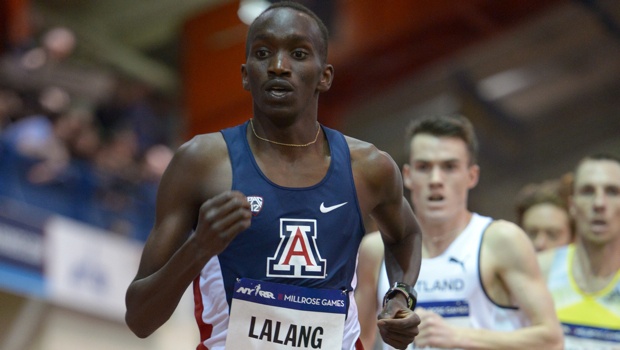
Lawi Lalang, an alien, is about to try something from the moon. The Arizona senior --who is the NCAA meet record holder at the mile (3:54.74), 3000-meters (7:45.94), and 5,000-meters (13:25.11)-- is attempting to win all three this weekend in Albuquerque, New Mexico.
Given the schedule and general logic, attempting those three races at a single NCAA indoor championship has been deemed both impossible and improbable. But Lalang’s name is on the list for all three and plenty of people, including most of the Flotrack office, think the triple crown is inevitable.
I imagine guys like BYU’s Jared Ward or Wisconsin’s Mohammed Ahmed, waking up every day, dreaming of an NCAA individual title. “This time,” they say as they look at their training logs on one monitor and the list of returners on another, “this time I’ve done it.” Then Lalang decides, perhaps on a whim, to run the 5k, and dreams are unmercilessly dented, if not shattered.
This isn’t the first time that Lalang has made us, mortals, watch something incomprehensible. Last year, if you don’t recall, Lalang pulled off a historic mile and 3k double. In order, Lalang ran a mile semifinal on Friday, March 8th (3:58.52), then won the mile final on Saturday, March 9th (3:54.74), and then, roughly two hours later, won the 3k (7:45.94).
There was also that “other” double from 2012, where Lalang held off Stanford’s Chris Derrick in both the 5k (13:25.11 to 13:26.88) and 3k (7:46.64 to 7:46.81). This double seems to be quickly forgotten by many, sort of like the younger son who writes for a track and field website while his sister is a radiologist at one of the best hospitals in the U.S. (I’m not self-projecting).
Perhaps it’s the “black sheep” of Lalang’s two doubles because it’s “easier” (huge emphasis on the quotation marks).
Quick history lesson. When the NCAA Indoor T&F Championships was founded in 1965, it included the 1,500-meters/mile and two-miles/3,000-meters. Between then and now, only six men, including Lalang, have been able to accomplish the mile and 3k double.
But in 1989, the NCAA, or whoever is behind that black curtain, decided to add the 5,000-meters. Between then and now, four men, including Lalang, have been able to accomplish the 3k and 5k double. They’re listed below:
| Year | Name | School | 3k | 5k |
| 2000 | David Kimani | South Ala. | 7:52.64 | 13:52.58 |
| 2001 | David Kimani | South Ala. | 8:03.29 | 13:42.32 |
| 2003 | Alistair Cragg | Arkansas | 7:55.68 | 13:28.93 |
| 2004 | Alistair Cragg | Arkansas | 7:55.29 | 13:39.63 |
| 2009 | Galen Rupp | Oregon | 7:48.94 | 13:41.45 |
| 2012 | Lawi Lalang | Arizona | 7:46.64 | 13:25.11 |
The numbers don’t lie: historically, it’s much more common for someone to win the 3k and 5k instead of the mile and 3k.
Then again, there’s also the “other” triple from just five years ago. Back before he was the American record holder and Olympic silver medalist, Oregon’s Galen Rupp was a college senior who had never won an NCAA track title and could barely break four minutes in the mile. But in 2009, Rupp won the 5,000-meters, Distance Medley Relay, and 3,000-meters at NCAAs. I don’t want to get too far off topic here, so if you’re interested, you can read last year’s reflection here.
Editor’s Note: For what it’s worth, none of the men in the table above other than Rupp anchored their DMR for the win. He’s in a class of his own, for now.
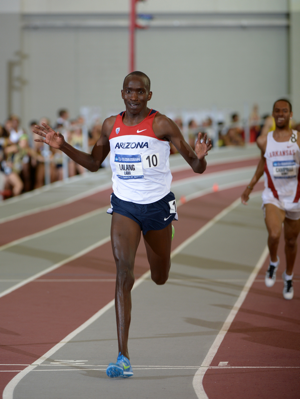 So what is a 3:52.88 and 13:00.95 guy going to do at an NCAA Indoor Track and Field Championship? Win another two titles? Run another meet record? Help his team finish third overall with just him, the team’s #1 ranked high jumper, and their freshman weight thrower?
So what is a 3:52.88 and 13:00.95 guy going to do at an NCAA Indoor Track and Field Championship? Win another two titles? Run another meet record? Help his team finish third overall with just him, the team’s #1 ranked high jumper, and their freshman weight thrower?
Yes, yes, and we can’t wait until Arizona finishes 3rd with 40 points.
But those feats that defy logic no longer suit Lalang. He’s finished with doubling down and cackling as he rakes in everyone’s chips.
Lalang wants to parlay this year’s championships. And for good measure: the majority of our office thinks he can pull it off.
Since everyone else has made up their mind, I’ve been singled out as the lone voice of hope [for everyone else].
Below I’ll list the event, the time it goes off, what Lalang ran last year, the start list, and everyone’s thoughts on the matter.
Two last tidbits of information to remember: Albuquerque is at 5,100 feet. Not that the altitude is going to be a killer, but what happened the last time Lalang was in town? He ran his season opener at the UNM Cherry and Silver Invitational, where he finished 2nd (1:51.20) behind Ryan Hill, who was coming off a double.
Editor's Note #1: Recovery will be the most important part for Lalang this weekend, not tactics.
Editor's Note #1: Recovery will be the most important part for Lalang this weekend, not tactics.
Editor's Note #2: Then again, that was his season opener. It's really being use to demonstrate that he's not invincible, specifically in these conditions.
Friday, March 14th
Men’s Mile Semifinal - 6:00pm MT
Lawi Lalang’s 2013 time and place: 3:58:52, 1st
Mitch Kastoff: I didn’t bother to ask anyone about this race. If Lalang doesn’t make it out of the semifinal, I’ll just be posted up in the media room, tweeting out this GIF for the rest of the weekend and laughing like a lunatic:


Friday, March 14th
Men’s 5,000-meter final - 8:25pm MT
Lawi Lalang’s 2013 time and place: N/A
Event 7 Men 5000 Meter Run
===========================================================================
Name Year School Seed
===========================================================================
1 622 Reed Connor SR Wisconsin 13:37.42
2 602 Patrick Tiernan FR Villanova 13:37.73
3 518 Edward Cheserek FR Oregon 13:40.51
4 327 Lawi Lalang SR Arizona 13:41.58
5 358 Jared Ward SR BYU 13:42.17
6 478 Luke Caldwell SR New Mexico 13:42.50
7 558 Erik Olson JR Stanford 13:42.56
8 414 Maksim Korolev SR Harvard 13:42.56
9 394 Mark Parrish JR Florida 13:43.15
10 528 Parker Stinson JR Oregon 13:43.51
11 619 Mohammed Ahmed SR Wisconsin 13:44.32
12 489 Brian Shrader JR Northern Ari 13:44.55
13 477 Adam Bitchell SR New Mexico 13:44.70
14 559 Joe Rosa JR Stanford 13:44.85
15 366 Morgan Pearson JR Colorado 13:49.30
16 630 James Leakos SR Harvard 13:49.78
Gordon Mack: He ran 13:00.95 last year. I don’t even know why we’re having this debate.
Alex Lohr: If Bernard Lagat was in this meet, would you be questioning if he could pull this off? Oh weird: that's his training parter, who he beat last year in the 5k.
Isaac Wood: He has the fastest PR in the field by almost 30 seconds...he can dog this race and still win no problem.
Ryan Fenton: Remember when Lawi Lalang beat Kenenisa Bekele, the world record holder?
Mitch Kastoff: Considering his unbelievable runs in Ostrava and Monaco, this seems to be a forgone conclusion. My best guess is he’ll just let everyone else do the work, until he feels the time is right to deploy a long, drawn out kick and run the field into the ground.
That’s pretty much what he did to win the MPSF 5k. And the 10k outdoor. And the 5k outdoor.
Although his victory this winter was decisive, there were still a valiant few who hung with him for 4,700-meters.
The two men who showed commendable guts against the NCAA’s best was Colorado’s Morgan Pearson and Stanford’s Joe Rosa. They may not be able to push Lalang, but they’ll most likely sit on him for as long as possible with the hope that he leaves it too late.
Otherwise, there are plenty of names in the field who might try and run a marginally tired Lalang into submission. Because if they just hand over the almost certain title to the Arizona junior, what’s the point of even showing up?
Of the 13 other entrants, you can pretty much pick anyone and assume they’ll do something crafty. The Badgers tend to work together, so watch out for the University of Wisconsin duo of Reed Connor and Ahmed. We’ve seen BYU’s Ward has run from the front before. After a big cross country season, Harvard’s Maxsim Korolev has finally emerged as someone to be reckoned with.
Don't forget about New Mexico's Luke Caldwell. He's run sub-13:30, is on his home track, and is apparently ready to rock and roll.
Don't forget about New Mexico's Luke Caldwell. He's run sub-13:30, is on his home track, and is apparently ready to rock and roll.
But then there’s the reigning NCAA Cross Country champion, Edward Cheserek. The freshman, who took down the seemingly unstoppable Kennedy Kithuka (Texas Tech), has been on a tear this winter.
He first anchored Oregon’s “A” DMR to a 9:28.91 at the UW Invitational, then won the UW Husky Classic 5k in 13:40.51, and for his final race this winter, won the MPSF 3k in 7:47.20.
If anyone is going to upset a big name, it’s going to be Cheserek.
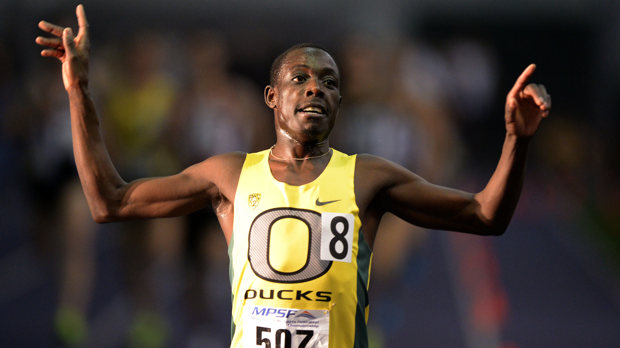

Saturday, March 15th
Men’s Mile Final - 6:00pm MT
Lawi Lalang’s 2013 time and place: 3:54.74, 1st
Event 5 Men 1 Mile Run Prelims
==========================================================================
Name Year School Seed
==========================================================================
1 327 Lawi Lalang SR Arizona 3:52.88
2 596 Anthony Rotich JR UTEP 3:55.86
3 603 Jordan Williamsz SO Villanova 3:56.84
4 438 Matt Hillenbrand SR Kentucky 3:57.00
5 497 Jeremy Rae SR Notre Dame 3:57.25
6 353 Rich Peters JR Boston U. 3:57.27
7 379 Will Geoghegan JR Dartmouth 3:58.04
8 445 Sam Penzenstadler JR Loyola (Ill. 3:58.21
9 521 Mac Fleet SR Oregon 3:58.25
10 427 Matthew Gillespie SR Iona 3:58.48
11 380 Steve Mangan FR Dartmouth 3:58.65
12 479 Elmar Engholm FR New Mexico 3:58.90
13 372 John Gregorek SR Columbia 3:58.95
14 616 Izaic Yorks FR Washington 3:59.04
15 545 Michael Williams SR Princeton 3:59.21
16 484 Isaac Presson SR North Caroli 3:59.23
Gordon Mack: He ran 3:33.20 in the 1500m and 3:52.88 in the MILE. There’s really nothing else that needs to be said.
Alex Lohr: If we asked any athlete in the indoor mile field, "How do you beat Lawi?" They would all sheepishly turn away in shame, because they have no clue.
Isaac Wood: Too much combination of raw speed and strength.
Ryan Fenton: Do you remember the double in the 5k and 3k versus Chris Derrick?
Mitch Kastoff: Two races down, two to go, and two tired legs on Lalang.
There’s no way that this one will pan out like last year’s strange final. Lalang is just going to sit in the pack, make his way to the front with 400 - 500m to go, and match any and all moves from the field.
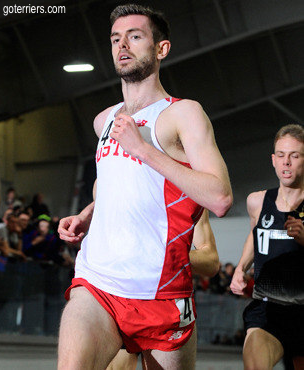 There are three guys in the field that, on most days, I would pick to get the jump on everyone. However, you’re only as good as your last race, and two of the potential picks have had poor outings right before Nationals.
There are three guys in the field that, on most days, I would pick to get the jump on everyone. However, you’re only as good as your last race, and two of the potential picks have had poor outings right before Nationals.
Notre Dame’s Jeremy Rae has shown the late grit needed to win an NCAA title, but he failed to make it out of the ACC Mile Semifinals.
Oregon’s Mac Fleet, the defending NCAA outdoor 1500m champion, can win in almost any situation. In front of the zealous home crowd at Hayward Field, he maintained incredible positioning over the last lap and kicked away from the field. However, he looked lackluster at the MPSF 800m, and finished 5th in 1:50.06.
You want an upset pick? Boston University’s Rich Peters. The junior is coming off having just run the NCAA indoor 1k record, plus he has a ton of experience on the national stage. That being said, he’s never really run at altitude.
Of course, there's also Anthony Rotich, who has run well at altitude this winter.
Of course, there's also Anthony Rotich, who has run well at altitude this winter.
Saturday, March 15th
Men’s 3,000-meter final - 7:40pm MT
Lawi Lalang’s 2013 time and place: 7:45.94, 1st
Event 6 Men 3000 Meter Run
==========================================================================
Name Year School Seed
==========================================================================
1 327 Lawi Lalang SR Arizona 7:44.20
2 518 Edward Cheserek FR Oregon 7:47.20
3 365 Jake Hurysz SR Colorado 7:50.50
4 558 Erik Olson JR Stanford 7:50.81
5 528 Parker Stinson JR Oregon 7:51.06
6 489 Brian Shrader JR Northern Ari 7:51.48
7 414 Maksim Korolev SR Harvard 7:51.52
8 622 Reed Connor SR Wisconsin 7:51.78
9 427 Matthew Gillespie SR Iona 7:52.24
10 358 Jared Ward SR BYU 7:52.51
11 353 Rich Peters JR Boston U. 7:52.61
12 367 Ben Saarel FR Colorado 7:52.61
13 462 John Simons SR Minnesota 7:52.62
14 520 Trevor Dunbar SR Oregon 7:53.13
15 455 Caleb Rhynard SO Michigan Sta 7:53.34
16 507 Kirubel Erassa SR Oklahoma St. 7:53.53
Gordon Mack: Eric Jenkins, Kemoy Campbell, Paul Chelimo and Kennedy Kithuka aren't running.
Alex Lohr: With an hour and a half between the mile final and 3k, Lawi will be able to fully recover and still have time to throw a pizza on top of the Breaking Bad house.
Isaac Wood: Because according to his coach, James Li, the only person who can beat him, is himself.
Ryan Fenton: There's a lot of "altitude" talk. Are you forgetting this guy is from Kenya?
Mitch Kastoff: I can see it now. Lalang will step to the line, dripping with sweat, already breathing heavy from his trio of races. He’s running on pure momentum now. Everyone cautiously watches him take a final set of strides before he returns to the line, shakes a few hands, and then gets into his starting stance.
Everyone wants to beat him. Everyone knows he’s teetering with exhaustion. But before the official can even raise his gun, Lalang takes a quick glance at the field, and without uttering a word, says, “Come get me.”
Will anyone look back and mutter a defiant, “No?” Of course.
This will be the finale to end all finales, and, man, it’s going to be good.
Of the 15 other men entered, at least 9 are doubling back from either the mile or 5,000-meters (some are entered in the DMR, too). It’s not like Lalang won’t be tired by then as well, but it’ll take someone fresh to make something special happen. There’s one exception, and while you can probably guess who it is, we’ll leave him for later.
That leaves us with Colorado’s Jake Hurysz, Colorado’s Ben Saarel, Minnesota’s John Simons, Oregon’s Trevor Dunbar, Michigan State’s Caleb Rhynard, and Oklahoma State’s Kirubel Erassa.
Don’t be surprised if the Colorado duo tries to control the race. We’ve seen what they can do at altitude, like at the Pac-12 Cross Country Championships. Hurysz has been slugging out the miles all fall and ready to be back on the national stage. Saarel, on the other hand, has taken some knocks this season, but is such an incredible talent. Neither can be discounted.
Dunbar has been working on his speed, and has shown us some fantastic finishes at the University of Washington’s Dempsey. However, it looks like he may anchor Oregon’s DMR the night before.
If you remember the DQ controversy from last winter, you’ll note that Erassa was one of the three men trailing Lalang at the bell. He may be a late entry to the meet, but he's in similar form compared to last year. Prior to the 2013 NCAA Indoor Championships, Erassa's season's best was 7:50.92 from the UW Husky. This year, his SB is 7:53.53, which came about two weeks ago at the Big 12 Indoor Championship.
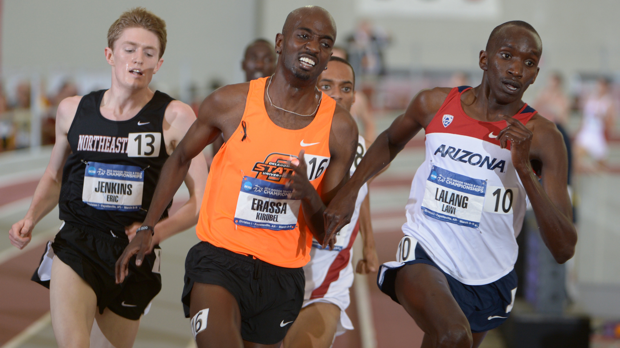

Oh yeah.
Then, again, there’s Cheserek. Oregon’s other entry in the 3,000-meters has run an impressive 7:47.20 this season. If he were running this one fresh, things would be interesting. But because he’s doubling back, I’m just a little hesitant to make a bold prediction.
Who’ll have more retroactive lactic acid in his legs: Cheserek after the 5,000-meters or Lalang after three races?
Can Cheserek even hang with Lalang?
If anyone is going to beat Lalang, it’s going to come in this race. If anyone is going to defy the odds, again, it’s going to be Cheserek.
Even if he falters, the fact that Lalang is even trying to complete the triple blows my mind. Mere mortals would physically be unable to even consider such a feat. It’s one thing to say that you’re going to do something, but it’s another to, you know, actually do it.
If Lalang can win the triple crown, it will go down as one of, if not the most, impressive display of talent and determination in NCAA history.
If Lalang can win the triple crown, it will go down as one of, if not the most, impressive display of talent and determination in NCAA history.